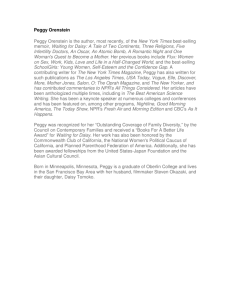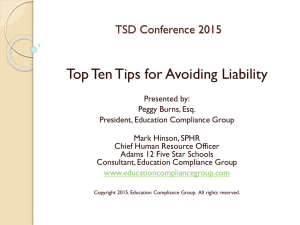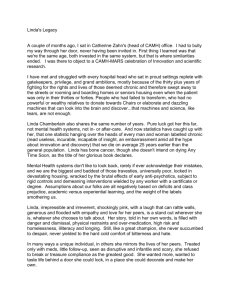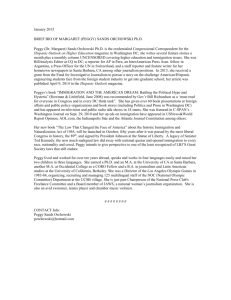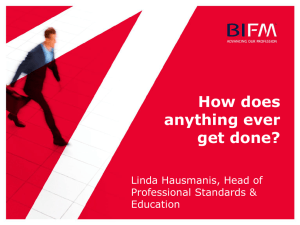Peggy Peplow by Linda House - Mill Street Housing Society
advertisement
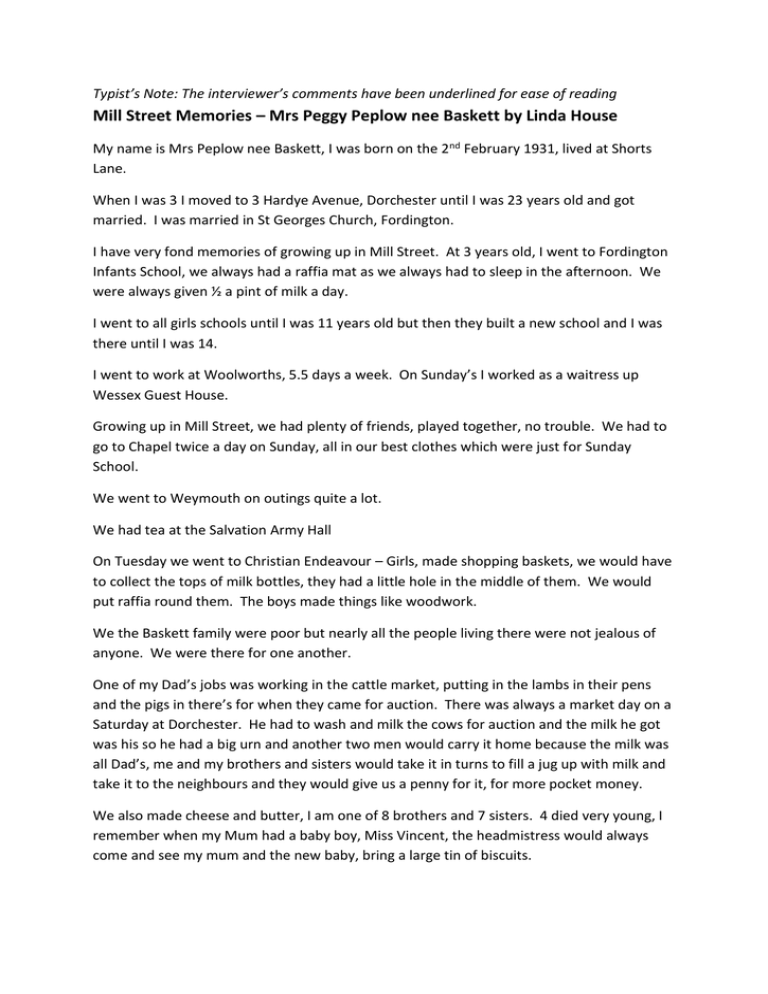
Typist’s Note: The interviewer’s comments have been underlined for ease of reading Mill Street Memories – Mrs Peggy Peplow nee Baskett by Linda House My name is Mrs Peplow nee Baskett, I was born on the 2nd February 1931, lived at Shorts Lane. When I was 3 I moved to 3 Hardye Avenue, Dorchester until I was 23 years old and got married. I was married in St Georges Church, Fordington. I have very fond memories of growing up in Mill Street. At 3 years old, I went to Fordington Infants School, we always had a raffia mat as we always had to sleep in the afternoon. We were always given ½ a pint of milk a day. I went to all girls schools until I was 11 years old but then they built a new school and I was there until I was 14. I went to work at Woolworths, 5.5 days a week. On Sunday’s I worked as a waitress up Wessex Guest House. Growing up in Mill Street, we had plenty of friends, played together, no trouble. We had to go to Chapel twice a day on Sunday, all in our best clothes which were just for Sunday School. We went to Weymouth on outings quite a lot. We had tea at the Salvation Army Hall On Tuesday we went to Christian Endeavour – Girls, made shopping baskets, we would have to collect the tops of milk bottles, they had a little hole in the middle of them. We would put raffia round them. The boys made things like woodwork. We the Baskett family were poor but nearly all the people living there were not jealous of anyone. We were there for one another. One of my Dad’s jobs was working in the cattle market, putting in the lambs in their pens and the pigs in there’s for when they came for auction. There was always a market day on a Saturday at Dorchester. He had to wash and milk the cows for auction and the milk he got was his so he had a big urn and another two men would carry it home because the milk was all Dad’s, me and my brothers and sisters would take it in turns to fill a jug up with milk and take it to the neighbours and they would give us a penny for it, for more pocket money. We also made cheese and butter, I am one of 8 brothers and 7 sisters. 4 died very young, I remember when my Mum had a baby boy, Miss Vincent, the headmistress would always come and see my mum and the new baby, bring a large tin of biscuits. Mum had two sets of twins, one born on 14th February 1935 and the other April 1936. Four children in 14 months. Muriel, one of the twins had a very bad skin condition only a couple of weeks old, she went into Dorchester County Hospital, they would not let her come home, instead they put her in Maiden Castle, she did not come every again to live with us. We saw her every day as she went to the same school as us. Mum and Dad tried very, very hard to try to get her back home to live with us but no one would listen. When she was 9 years old, they moved her all the way to Liverpool in a convent, the council gave us money to go to Liverpool on the train, we had to get bed and breakfast to bring her home for a holiday, I always went with Mum to get her. They kept her in that convent until she was 20 years old and then let her out into the big wide world. She did get married and have a son. I love Muriel very much. I was the eldest of the girls so had to help Mum a lot. I had every Monday off school as it was her busiest day but then every day was hard for her but I never heard her moan. We always had three meals a day and it was good food. We grew our own veg and we had hens. Dad used to get out a trap for rabbits, Mum made a lovely rabbit pie. One of us would go to the Bakery and if they had any stale bread, which they always had, she would make lovely bread pudding and cakes. It was quite hard during the war times as everything was on ration. Her chocolate cake – other kids used to love her cakes too. I loved the suet pudding with treacle running down the sides. I was 8 years old and home from chapel on a Sunday morning, I heard on the radio as it was a sunny day and people always had their doors and windows open that we were at war with Germany. It was the 3rd September and the Prime Minister, Mr Chamberlain, he said that when we heard this sound it was a siren to warn us that it was an air raid and we had to take shelter. Mrs White put her arms around me as I was so frightened. When the American soldiers came in 1942 to Dorchester, they came in large convoys, I did not know what racial meant until they were segregated, whether white or black they all went to war together and a lot of them got killed. When they got settled there used to be an MP at the top of Kings Road on duty, he would ask us kids if we would ask our mothers if they could make them a sandwich which they did. They always gave us money, more pocket money! Women did the washing, the County Council put two big concrete posts at the bottom of Hardye Avenue road end to stop the jeeps going through. My younger brother Len, he was to get the soldiers food etc from one of the four shops, two in Mill Street and two in Holloway Road. They brought him about to get the supplies. When I was in my teens, we had plenty of British soldiers, I should know, I married one. We girls were asked if we would go to the Army training hall at the Barracks once a month. They would put records on and we would partner a soldier and we all learnt to dance. We had lemonade and biscuits, it was great growing up in Mill Street. We had a three bedroom house, quite new. Bathrooms – the copper was in the bathroom. It was for water to give us baths once a week, to do the washing and cooking. They put the puddings in it. We had a big garden, plenty of room to play. We slept four in a bed, two top and two bottom. It was fun. They were really large bedrooms. When they used to chop down trees at Bluebell Copse, all the kids would get anything like an old pram or wheelbarrow and go to collect the logs. Linda: Your Dad was a Baskett obviously. What was your Mum’s maiden name. Peggy: Hellard. Linda: was she from Mill Street area? Peggy: She was born in Mill Street. Linda: So you’re all Mill Street stock? Peggy: Yes. Linda: Did you have many aunties and uncles Peggy: Loads Linda: Were they all around Mill Street were they? Peggy: Well, they lived in Holloway Road but not in the actual Mill Street. Auntie Babe lived there. Mrs Colver, she used to live in the old house there. One of the aunties. My granny Baskett used to... Did you know Sophie Pope’s up the top there, up Slyers Lane, you know that don’t you? Linda: Pound Lane Peggy: Those new houses, no, those two houses, the one that’s been made more modern, my granddad lived in there. Linda: I used to live in there once. Peggy: Did you? Linda: Yes, when I was a little baby. Peggy: How many years ago was that? Linda: I was born in 1953 Peggy: Ah well, I’ll tell you what, you must have lived next.... oh no, he died quite young. I was going to say, he was there in 53, which house did you live in? Linda: I’m not sure. Peggy: I expect you lived in the second, because I knew him when I was little and that was the first house. There was only two bedrooms wasn’t it? Linda: Yes, it was tiny Peggy: Yes tiny because her at the back, what was her name, there used to be a queer couple at the back who kept shouting at us. I forget what they were called. Linda: You said that when you moved to Hardye Avenue, you had quite a big house. Peggy: It’s the houses that are still there now. No, we only had three rooms but the lounge... downstairs.... you never been in them? Linda: Well I have but it was a long time ago. Peggy: I would say that the kitchen would be what you call like mine, like this but not like this I mean I would say.... (Peggy is now giving a visual measurement to Linda on the size of her kitchen in the Holloway Road house). You then had a big hall, a scullery and then the bathroom, well the kitchen and scullery and three big bedrooms because you could get double beds in them and Mum and Dad had the smallest room. Linda: Things were hard for you were they? Peggy: They were hard but if you know what I mean, they were hard but I wouldn’t say I was unhappy. It was lovely, it really was because what you had, like our Dad, at Christmas time, it was only when the last six – Colin, Keith, Gladys (Gladys is the youngest), Pat and .... well the last six of them, they were a lot better than we were because we went out, well, like I worked on a Sunday, I gave my mum that money to help her and we all had jobs to do, like the boys used to chop sticks and light the fire and light the range with it. She had to pay sixpence or maybe threepence to a doctor, so you couldn’t have free medicine, you never had any family allowance. Linda: Did your Mum ever go out to work? Peggy: No, never. Linda: It was just your Dad? Peggy: Yes. Linda: One of his jobs was at the market? Peggy: Yes, well then he was a builder and if like they built Marks & Spencer, he would help there, do you know what I mean? They were more or less odd job men then. Linda: He worked 5 or 6 days a week? Peggy: More than that, when it was haymaking, he didn’t come home till 11.00. When they had haymaking, they used to build .... and we used to climb up there. There’s a lot like that but that’s more or less talking about me, is that fine? Linda: Yes, that’s fine. Peggy: Our Bill said when I asked him, he said, are you sure its Shorts Lane, he said he was sure because I know her when she was scolded. He said he was behind her and everybody kept coming in because she was screaming and we thought she was going to die. I’ve got all scars on me and my auntie had to... Auntie Cissy – yes, she lived in Gregory’s buildings, she was my Mum’s eldest sister, she had to take me in a pushchair and she said I was screaming because she couldn’t... she had no phone but I don’t remember it because it was when I was..... me mum used to say “well you hadn’t been put in a dark room” because they used to tie you up if you had burns that was the way, it was the shock. Peggy: I’ve had two illnesses, you feel my head. I’ve had an aneurysm and it affected by eye and I was 53. It was the optician that found it. I couldn’t see out of the eye and I thought I’d better have my eyes tested. I did wear glasses for reading and I went to the hospital and they kept telling me to come back and there was nothing and I was getting worse and every time I went, my husband had to come with me because I couldn’t see proper and it was going all over and then he said “do you think she’s lying?” he said “we want a second opinion” and then when I came to, I saw this man and the next day, he came down and he said that I was going to Southampton but they didn’t know how to operate so they had tie my artery to clamp whatever was there. Linda: Did you lose anymore of your brothers or sisters young? Peggy: it’s on the paper I read out, oh no, I missed that. I didn’t say about the two that died together. Linda: What brothers and sisters did die? Peggy: The two eldest. (They’ve gone to find out about the brothers and sisters on the papers that Peggy had written down dates etc on) Peggy: Oh, another thing I forgot was my dear old Mum. She was very kind, everybody loved her and even when the gypsies and we were quite friendly with them because they used to call with the pegs and my Mum would give them clothes but they were second-hand when we had them or from jumble sales so they were happy to take them. Then there was the tramp, he used to come regular and he used to have a sandwich which Mum would give him and fill his billycan up and it wasn’t sliced bread then, you know. And another thing I forgot to tell you. My Mum, her third child Betty was born on the 22 nd of January 1929 died the 13th April 1931 aged two years, died in the isolation hospital. Douglas Ralph born 21st December 1929, died April 27th 1931, aged sixteen months. Both buried on the 2nd May 1931. Died in the isolation hospital, family lived in Holloway Road. Now, I will start at the beginning when we were all born. Walter Charles Baskett, born 1925 William born 1927 Betty Catherine born 22nd January 1929 Douglas Ralph born 21st December 1929 Peggy (me) born 2nd February 1931 They died when I was born look. Leonard born 1932 Hilda Mary born 1933 Lillian and Sylvia (twins) born 14th February 1935, died 1936 aged 15 months Jack born April 1936 Muriel born April 1936 (Muriel and Jack were twins) Gordon born June1927, died April 1928 aged 9 months Colin born 1939 Patricia born 1940 Keith and Gladys (twins) born July 1933 Me Mum loved us all and we were all the same. Linda: When you went to school at Fordington, what subjects did you do? Can you remember? Peggy: God knows, I can’t remember. We only used to do the three, wasn’t it. Reading, Writing and Arithmetic. Linda: Did you learn to read there then? Peggy: Well, really, we all could do well because we all helped each other. You always had a book which my Mother would always say about butter “you’ll always have butter”. Linda: So your Mum encouraged you to read? Peggy: I should have said she died at 63. Linda: but she encouraged you to read? Peggy: Oh yes Linda: and she encouraged you to go out and play? Peggy: Oh yes, we had our own friends, we was never lonely because we had each other but we had our own friends and they used to come to house even though it was crowded. Linda: What outings can you remember going on? Peggy: No, we only went to the seaside, only there. Linda: and your Dad never had time off, he worked all the time? Peggy: Yes, well he had time off but he.... we were all the same, there wasn’t anybody going on trips, we couldn’t afford it. Linda: Did you play down in the water meadows? Peggy: Yes. Linda; is there anything else you can remember and want to say? Peggy: Not at the moment.
